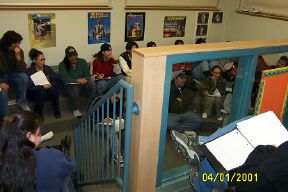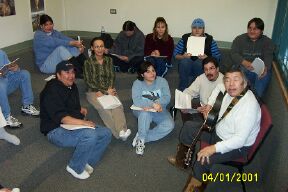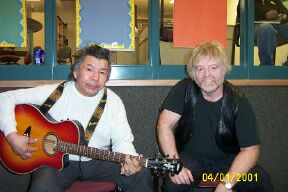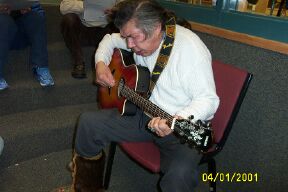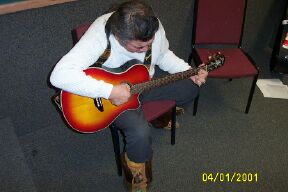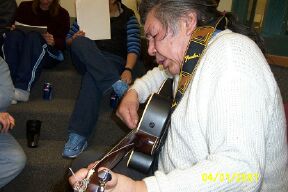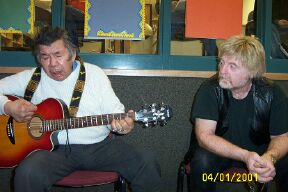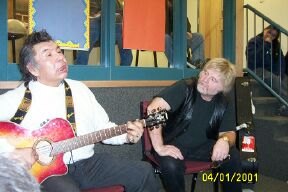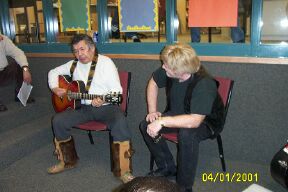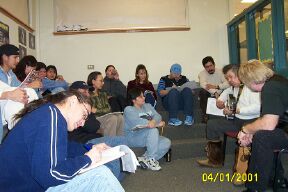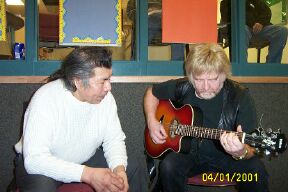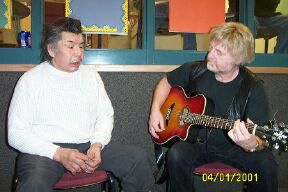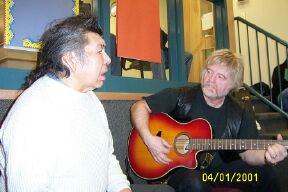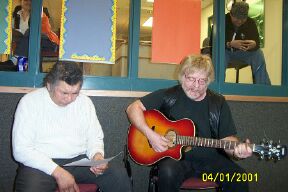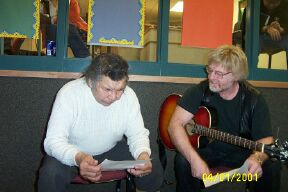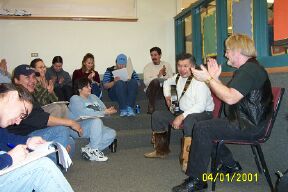SIDNEY CASTEL: BIOGRAPHY
Sidney Castel, the Cree pop music phenomenon, community health worker and
traditional story teller, was born in the remote northern settlement of
Pukatawagan, Manitoba, on March 30, 1934. Aged 68, he died suddenly of
asphyxiation due to natural causes at his home in Pukatawagan on March
21, 2003. Predeceased by his wife Sarah, he was the father of twelve. There
were seven daughters, Linda, Mary, Rosie, Mary, Jane, Flora and Melvina.
Sidney and Sarah had four boys, George, Donald, Sidney Joe and Tony, as
well as one adopted son, Lorne. Sidney is survived by over sixty grandchildren.
Most famous for his Pukatawagan Song and the Thompson Song, Mr. Castel
had just finished recording a new CD, Live at the Beaver Lodge, released
by Sunshine Records, when he passed away.
Always a hard worker, Sidney may have taken his cue from his father
Paul, who had travelled around the traplines as a Hudson's Bay trader,
exchanging flour, sugar, tea and tobacco for furs. This enterprising spirit
can be seen in the anecdote of Sidney the squirrel trapper. As a child
with no money, he craved the candy an independent merchant, a white man
known as a “big shot,” had on display near Otter Bay, where the family
was staying at the time. His mother laughed and suggested that he sell
his small furs, the squirrel and mink pelts. She asked him, “How do you
think you are going to buy those candies? Maybe you could trade your furs.
That merchant also buys furs.” Sidney said he would trade his small furs.
At the store he announced, “I come to buy, white man.” Pointing to his
shopping pouch, he asked, “Where’s your candies? [Put] your candies in
here, your chocolate bars in here.” The merchant took Sidney’s little pelts
in exchange. There was even some change left over.
As a young man, Sidney learned to fish and to trap. According to Cree
custom, the animals were always respected and never killed for no good
reason or just for pleasure. Alex Dumas was his teacher in the bush. Prior
to his urban work experiences, Sidney supported himself by means of traditional
fishing and trapping.
Sidney worked on the railway in the 1950s, and then for several years
he was employed as an orderly in hospitals in Swan River and The Pas. Later,
he was given the title of Honorary Doctor of Pukatawagan for his work as
a Community Health Representative, a post he held until his retirement.
People recall the time a woman in childbirth arrived at the nursing station
when there was no doctor in attendance. Undaunted, Sidney struggled to
put on surgical gloves. “Sidney, get out of here,” the attending women
told him. The baby was born before Sidney could manage to pull on the gloves.
In spite of his familiarity with bush life, Sidney possessed orienteering
skills that were less than perfect. One night in the 1980s he and his wife
became lost on a snowmobiling expedition in the area around Kississing
Lake near Sherridon. Realizing they were lost, they went to a shoreline
and started a campfire in order to warm up and to make themselves more
visible. When no rescuers came they tired of waiting and moved on. Soon,
they noticed a speck of light in the distance. They approached the light,
and
sure enough it was a campfire. They were happy to see it, but when they
stopped and looked more closely, they realized it was their own campfire.
They stayed there overnight and made their way home the next morning.
Sidney was, by his own admission, “not always a singer.” He was always
an entertainer, however, and often delighted listeners with stories and
with his impromptu performances. A self-taught singer-guitarist whose experience
was gained mainly from participation in the church choir and from listening
to recordings of his favourite singer, his musical hero Hank Williams Sr.,
Sidney’s quirky off-key and nonstandard musical arrangements appealed especially
to listeners with a generous sense of musical humour. His wife did not
like his singing and broke three of his guitars. However, his daughters
recall fondly how, twenty-five years ago, their father used to carry two
of them at a time in his arms and sing the Ballad of Pukatawagan, composed
to celebrate his return home after “twenty long years.” Sidney used to
claim, “This song will be a hit someday.” Then, people would laugh. At
public occasions he would sing the unlikely hit and again people would
laugh.
While his musical inspiration was Hank Williams, his martial arts hero
was Bruce Lee. Whenever Sidney was in mellow spirits, having imbibed a
bit much, he would be seen dressed in his kung-fu outfit, challenging people
to “take him on.” He would display his fists of fury and would assume a
kick-boxing pose, and then people would move aside, unsure whether Sidney
might not be serious in his intent. Some of Sidney’s fingers were a bit
mangled from having struck hard objects incorrectly.
In 2000 the First Annual Talent Search was hosted by Pukatawagan. Sidney's
song was not expected to win, but when the CD was released in 2001, there
was one constant request from the public: The Pukatawagan Song. For a month,
the song was number one on the NCI radio network. Sidney was often interviewed,
and he sang for the CBC and for CTV television in 2002. Sidney travelled
widely, prompting him once to make the tongue-in-cheek comment, “I’m having
more fun and making more money now than when I was a doctor.” “Boy, I can’t
hide myself any more!” he would say. Sidney never let fame go to his head,
though. A neighbour once commented, “Hey, Sidney, you’re famous!” Sidney
replied, “That's all right--I'll still talk to you.” He meant it.
An avid outdoorsman, Sidney would often travel out in his boat on weekends,
and more often after he retired at 65. Upon returning from a fishing expedition
in late 1999, he was asked if he was enjoying his retirement. "No! It's
boring!" he said. Apparently, fishing was not enough, but Sidney's final
career was just about to be launched thanks to the First Annual Talent
Search. Fondly remembered by his many friends and relatives, Sidney will
entertain future generations through his recordings and published stories.
Sidney Castel will long be remembered for his quirky sense of humour.
He loved to share a joke and make people laugh. Untold thousands of listeners
throughout the North and beyond truly enjoyed his unusual singing. His
community is proud of him as the man who “put Pukatawagan on the map.”
~ Robert J. Castel & David Westfall
Robert J. Castel is Sidney's half-third cousin
once removed, and his nephew by adoption; Robert’s mother is the adoptive
sister of Sidney Castel.
